I’m sharing how to enjoy nuts and seeds with some nutritiously nutty recipes, tips, and tricks.
Even before I became a Registered Dietitian, I was nuts about nuts. I love their crunch and that they are filling! And don’t get me started on nut butters. You know my love affair with nut butters goes back to the early days of KERF when I ate whipped banana oatmeal with nut butter almost every morning. Here’s my list of favorite nut butters.
Nuts and seeds are a nutrition enthusiast’s dream. Today’s post is all about nuts and seeds. Let’s get crackin’…
Nuts vs. Seeds
Nuts
Historically, nuts served as an alternative to meat and fish; they were vital during periods of famine when hunting and fishing were hindered. Varied in shape, size, texture, and taste, nuts are common in diets around the world. Until more recent years, nuts were considered high-fat villains but now are known as nutritional superheroes (yay!).
Common Types of Nuts
- almonds
- Brazil nuts
- cashews
- chestnuts
- hazelnuts
- macadamia nuts
- peanuts
- pecans
- pine nuts
- pistachios
- walnuts
Have you tried them all?
Seeds
Seeds are the means by which most plants propagate, so they are particularly nutrient-dense. Beans, peas, most nuts, and all grains are technically seeds, but some fall in a specific category loosely called edible seeds. These seeds tend to be smaller and have a higher proportion of fat (like sesame and flax). Many seeds are primarily used for their oils.
Common Types of Seeds
- chia seeds
- flaxseed
- hemp seeds
- poppy seeds
- pumpkin seeds
- sesame seeds
- sunflower seeds
Nut & Seed Nutrition
Both nuts and seeds have rich nutrient profiles.
Nuts are a nourishing source of plant protein, heart-healthy fatty acids, and an array of vitamins are minerals. Nuts are high in good fat (mono and polyunsaturated) which have been known to help lower cholesterol. Each nut stands out for something different: almonds offer excellent protein and vitamin E, while walnuts are known for their alpha-linolenic acid content.
Fun fact: 2-3 Brazil nuts provide a daily dose of zinc and selenium.
A study in 1997 found that people who ate nuts at least five times a week cut their risk of a heart attack in half, compared with those who ate nuts less than once per week (source: Wellness Foods A-Z).
Seeds supply important minerals as well as a moderate amount of protein (though incomplete). Sunflower, safflower, and sesame seeds are most commonly used to make cooking oils. It’s noteworthy that the type of fat in seeds in primary polyunsaturated, some of which provide essential fatty acids. For example, flaxseed provides ALA, which is linked to a reduced risk of heart disease. Sunflower and pumpkin seeds, two other commonly consumed seeds, provide vitamin E and iron.
How To Store Nuts & Seeds
- Nuts should be stored in airtight containers to block out moisture and keep the oils in the nuts from going rancid. Glass jars in a dark cabinet are perfect.
- Unshelled nuts can be stored in a cool, dry place for 2-4 months.
- Shelled nuts or seeds need to be stored in the fridge or freezer and will last up to 1 year.
- Ground nuts or seeds should be stored in the fridge in airtight containers for up to 1 week (not long!).
- Flax, chia, and hemp seeds should be ground before eating for optimal digestibility; ground almonds and hazelnuts work well in baked goods (like these almond flour chocolate chip zucchini muffins).
How To Soak Nuts
Why soak nuts & seeds? Soaking raw nuts and seeds makes them easier to digest and increases nutrient absorption.
- Cover 4 cups of raw nuts or seeds with water and stir in 1 Tbsp. of sea salt.
- Soak 6-7 hours.
- Drain in a colander.
- Spread on a baking sheet and bake in an oven at 150F for 12-24 hours to dry.
How To Make Nut & Seed Butters
Love nut butters as much as I do? We always have a variety of different nut butters on hand. And while I have several store-bought favorites, homemade is truly best.
Nut Butter Recipes
This video from Minimalist Baker is a great step-by-step tutorial on how to make nut butters (it’s really quite easy!).
How To Enjoy Nuts & Seeds
- Spread nut or seed butter on apple slices, carrots or celery.
- Spread nut or seed butter on your favorite toast. Add a sprinkle of chia or hemp seeds.
- Sprinkle toasted pine nuts on top of pasta.
- Sprinkle toasted walnuts or nutty granola on top of yogurt.
- Add toasted pumpkin or sunflower seeds as a salad topper.
- Make your own trail mix: 1 cup mixed nuts and seeds, 1 cup dried fruits + a handful of chocolate chips.
- Blend a dollop of nut butter into your favorite smoothie. Boost it with a tablespoon of ground chia or flax seed.
- Finely chop nuts and add to breading for fish or poultry.
Healthy Nut & Seed Recipes
1. Easy Energy Bar Recipe
This easy energy bar recipe is filled with healthy whole grains, nuts, and seeds. Even better, no cooking required!
2. Nutty Granola
This homemade nutty granola recipe is a family favorite, courtesy of my father-in-law, John! It’s packed with nuts, seeds, and coconut and is made without oats, so it’s gluten-free. Almond meal, honey, and coconut oil bind it together.
3. Maple Sesame Almonds
Slightly sweet, slightly savory, 100% crunchy.
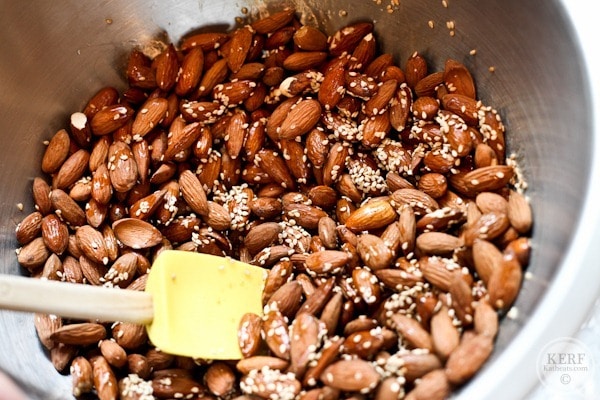
4. Cinnamon Vanilla Almond Butter
This creamy homemade almond butter recipe is made in a food processor and turns raw almonds into drippy almond butter in less than 10 minutes.

5. Toasted Coconut Walnut Butter
This buttery, earthy and toasted walnut butter has the essence of coconut and the texture of cookie dough.
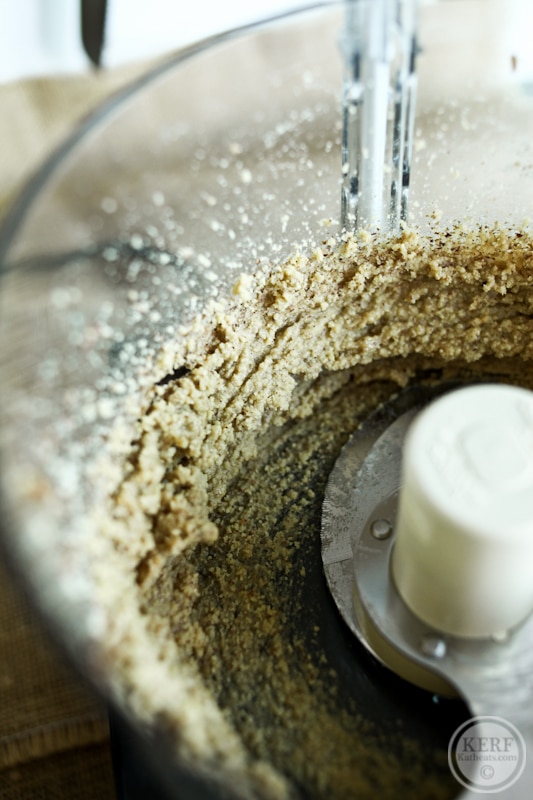
6. Pumpkin Spice Almond Butter
When you make your own almond butter, you can flavor it however you like! In this Pumpkin Spice Almond Butter recipe, pumpkin spices make homemade drippy almond butter fall festive!
7. Homemade Crunchy Peanut Butter
This homemade crunchy peanut butter recipe is made in a food processor and turns salted peanuts into peanut butter in less than 10 minutes!
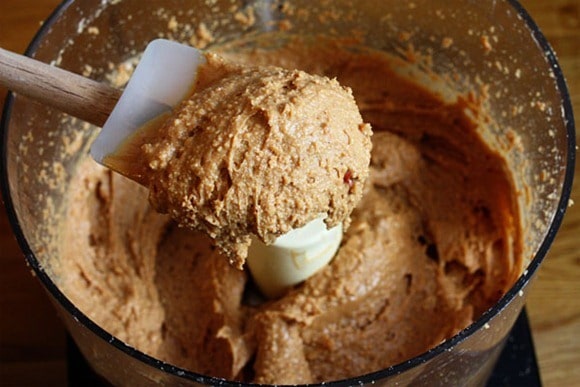
8. Salted Almond Chocolate Bark
This salted almond chocolate bark recipe is easy to customize with whatever nuts you have on hand. The flaked salt is key! It also makes a perfect homemade gift.
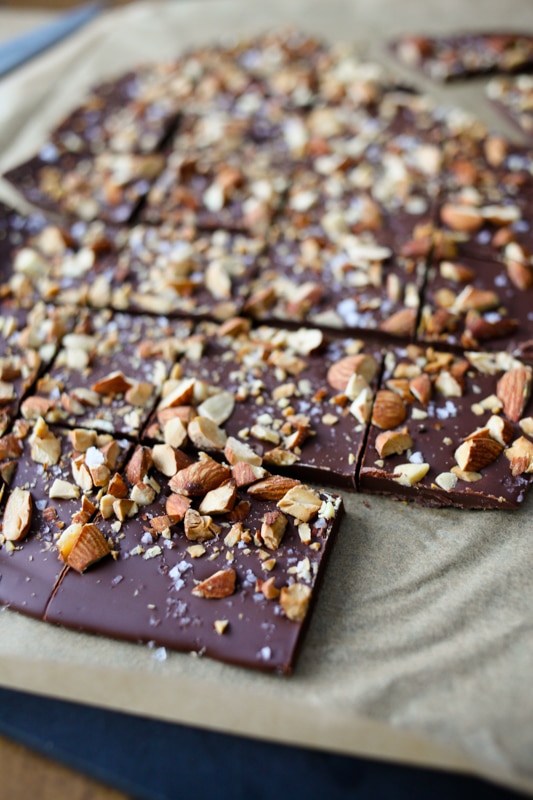
9. Cranberry Almond Chocolate Clusters
The base of this recipe is simply nuts and dried fruit, but the clusters are spiced up a bit with cinnamon, nutmeg, a pinch of cayenne, and a sprinkle of sea salt!

10. Apple Walnut Quinoa
This easy baked oatmeal includes a banana (for texture and natural sweetness), pumpkin pie spice, sliced local green apples, and crunchy walnuts toasted in the oven.
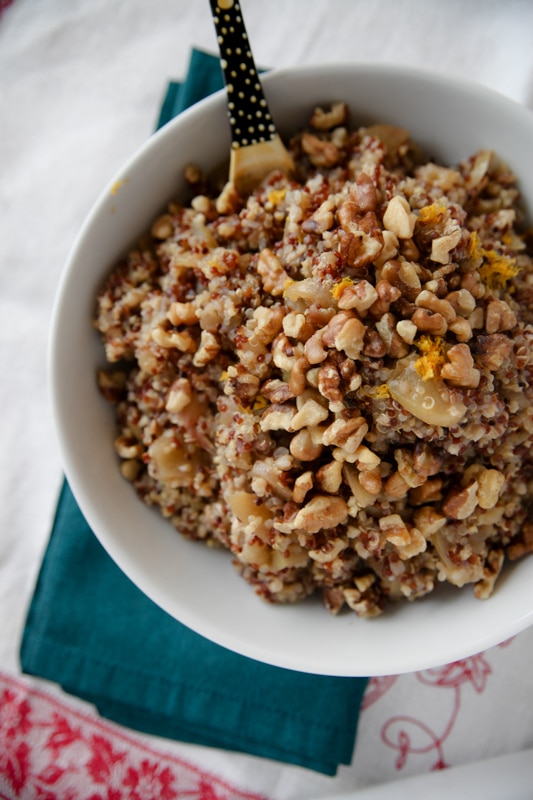
11. Spiced Walnut Pimento Cheese
This pimento cheese is lightened up with Greek yogurt and packed with heart-healthy walnuts.
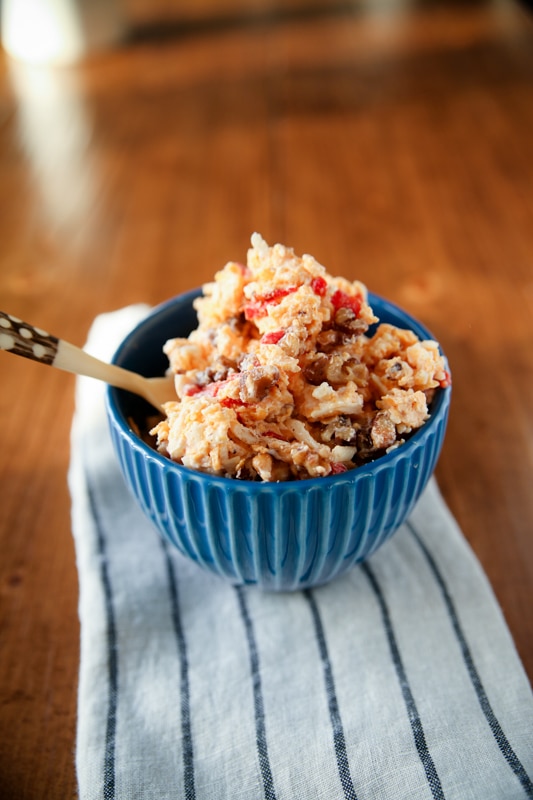
12. Apple Walnut Baked Oatmeal
Made with freshly picked fall apples, this baked oatmeal recipe is simple and easy to put together on a busy morning.
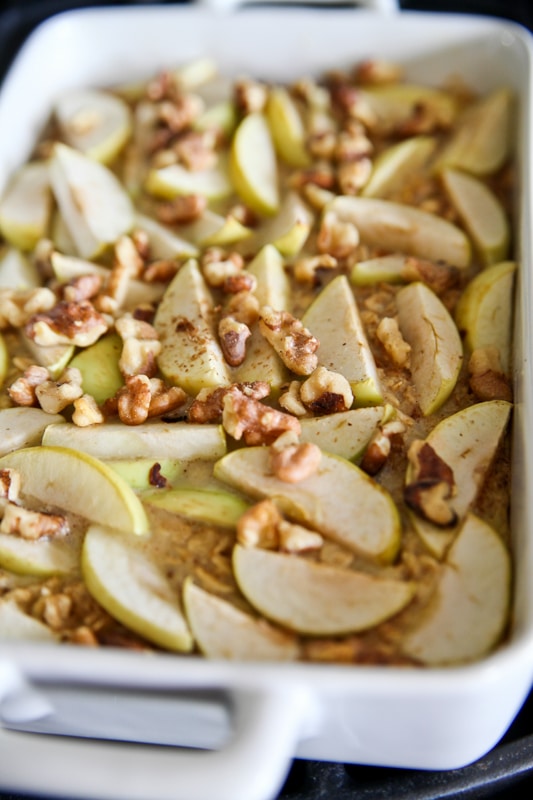
You may also enjoy:


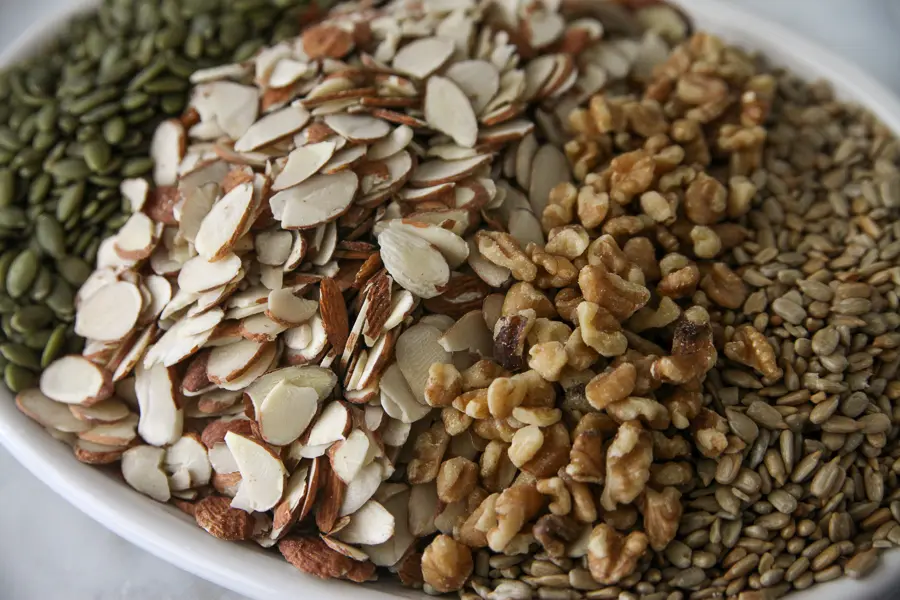
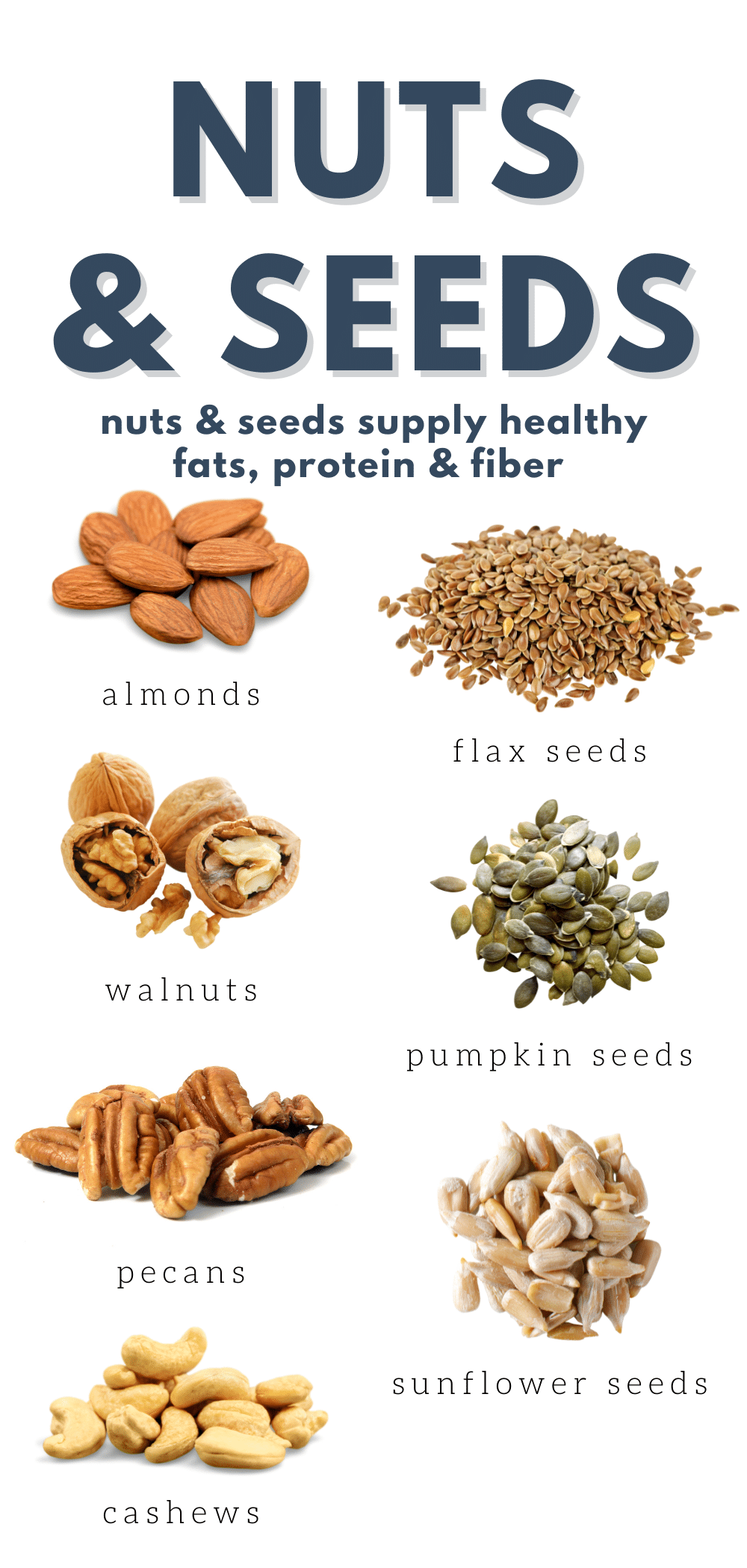
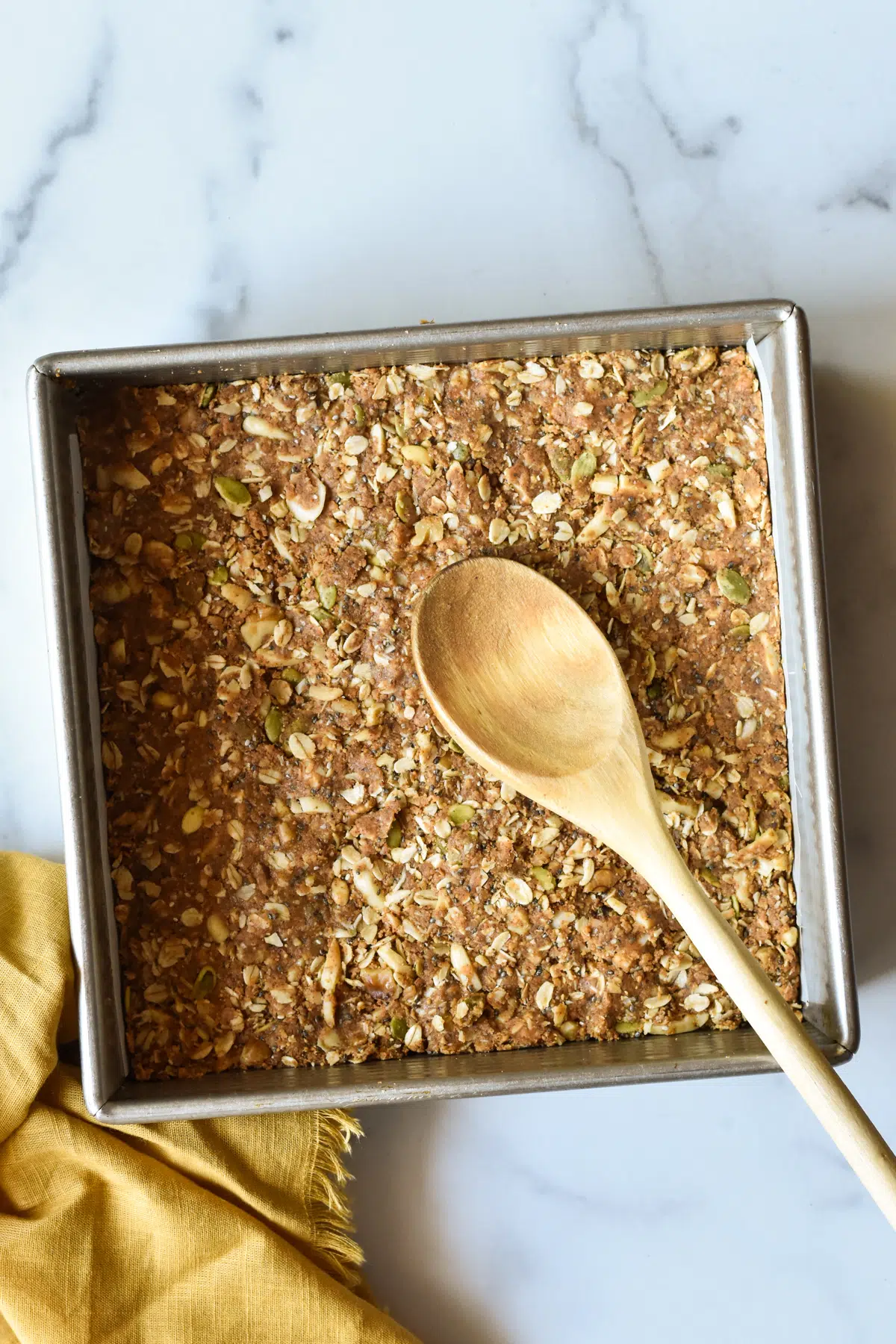
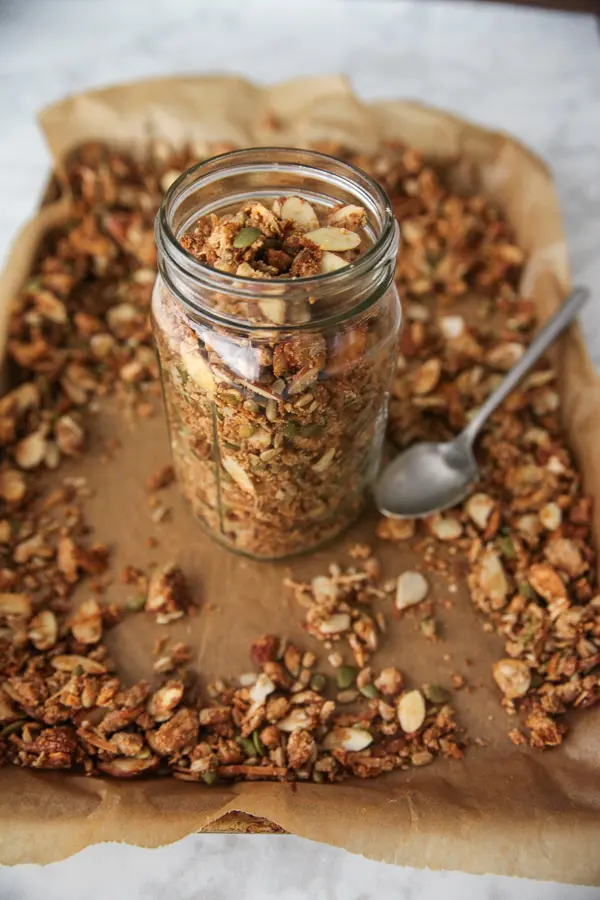
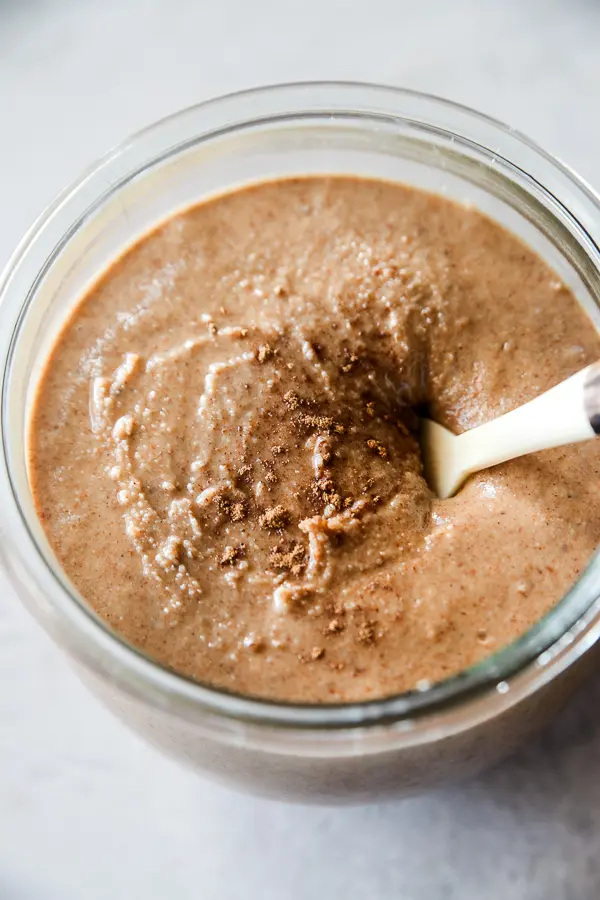


Kori says
Give me all the nuts and seeds in all types of dishes! They are so versatile, and I eat them daily.